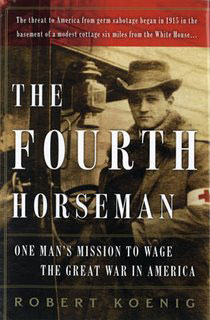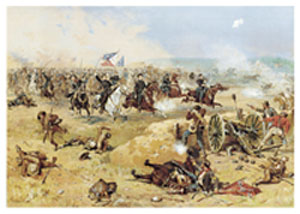Harvard University stands poised to appoint its first woman president, named Drew Gilpin Faust. Prof. Faust is, I am very happy to report, a Civil War historian of some distinction.
Prof. Faust has written a number of very well-regarded books on the Civil War South. Her most recent title, Mothers of Invention: Women of the Slaveholding South in the American Civil War, was described as “a major contribution to both Civil War historiography and women’s studies in this outstanding analysis of the impact of secession, invasion and conquest on Southern white women” by Publisher’s Weekly. She is also the author of The Creation of Confederate Nationalism: Ideology and Identity in the Civil War South, a study …
The work I do serves two purposes. First, and foremost, it scratches my teaching itch. It’s how I fulfill my need to write, which is something of a compulsion.
It’s also intended to be something of a money-making venture. Now, I fully understand that my work is never, ever going to make any bestseller list. At the same time, doing the research, acquiring illustrations, and paying cartographers costs money. Sometimes, it costs a LOT of money. The upshot, therefore, is that I have to at least be able to break even in order for me to be able to justify the expenditure to Susan. In a perfect world, I even get to make some profit. Hopefully, I will be able …
 I’ve long maintained a deep and abiding interest in Hubert “Leatherbreeches” Dilger. As a student of the Eleventh Corps, I’ve had a chance to study Dilger’s actions at both Chancellorsville and Gettysburg in some detail, and I’m convinced that there was probably no better company level artillery officer on either side during the Civil War than Dilger. Dilger’s stand in the Plank Road at Chancellorsville–just his six Napoleons against Jackson’s whole corps–is one of those wonderful stories that doesn’t get the attention it deserves. Dilger was awarded a Medal of Honor for that stand, and rightly so.
I’ve long maintained a deep and abiding interest in Hubert “Leatherbreeches” Dilger. As a student of the Eleventh Corps, I’ve had a chance to study Dilger’s actions at both Chancellorsville and Gettysburg in some detail, and I’m convinced that there was probably no better company level artillery officer on either side during the Civil War than Dilger. Dilger’s stand in the Plank Road at Chancellorsville–just his six Napoleons against Jackson’s whole corps–is one of those wonderful stories that doesn’t get the attention it deserves. Dilger was awarded a Medal of Honor for that stand, and rightly so.
He probably also should have been awarded one for his work at Gettysburg on the first day, also. His performance that day was …
My self-imposed break of several months has about run out of steam. After several months of absolutely no motivation, I’m finally starting to feel motivated to get back to work. So, I think that the plan is to get back to work tomorrow night, after one more night of goofing off to watch the Super Bowl. Tomorrow night, I start working on my Boyd article in earnest. And there’s other stuff backed up in the queue behind it. So, I guess I’d better get back at it…..
The break was much needed. I feel much more motivated about things, and I feel much more prepared to face the pile of accumulated projects.
Scridb filter…Yesterday, I got a call from JD, asking me if I had received a letter in yesterday’s mail accusing us of plagiarism of our work on the charge of the 1st Delaware Cavalry at Westminster, Maryland on June 29, 1863. Specifically, we were accused of plagiarising an unpublished manuscript on these events written by correspondent, submitted to the Carroll County, Maryland Historical Society, but never published by them. Neither JD nor I had ever even heard of the manuscript, let alone seeing it. In short, we’ve been accused of stealing from a manuscript we’ve never seen.
Neat trick, eh? I’ve often wished that I was good at mind-reading; I know my wife wishes I was a mind-reader when it comes …
 While working on the Kelly’s Ford article, I re-discovered a couple of fabulous, parallel quotes that describe some of the mounted charges and countercharges that took place during the Battle of Kelly’s Ford. What’s particularly interesting about them is that one is by a Yankee trooper and one is by a Confederate trooper, but the similarity is really striking. Have a look:
While working on the Kelly’s Ford article, I re-discovered a couple of fabulous, parallel quotes that describe some of the mounted charges and countercharges that took place during the Battle of Kelly’s Ford. What’s particularly interesting about them is that one is by a Yankee trooper and one is by a Confederate trooper, but the similarity is really striking. Have a look:
“A cavalry charge is a terrible thing. Almost before you can think, the shock of horse against horse, the clash of steel against steel, crack of pistols, yells of some poor lost one, as he lost his seat and went down under those iron shod hoofs that knew no mercy, or the shriek of some horse overturned and …
 The death of Barbaro yesterday reminded me yesterday of just how fragile horses are. For all of their size and strength, horses are delicate, fragile beasts. The truth is that they were never intended to tolerate the abuse that we humans so often subject them to. And unless properly fed, watered, and cared for, they will break down.
The death of Barbaro yesterday reminded me yesterday of just how fragile horses are. For all of their size and strength, horses are delicate, fragile beasts. The truth is that they were never intended to tolerate the abuse that we humans so often subject them to. And unless properly fed, watered, and cared for, they will break down.
Capt. Charles Francis Adams served in the 1st Massachusetts Cavalry. The grandson of one U. S. President, and the great-grandson of another, Adams possessed the family’s gift for the written word. The winter of 1863 was an especially harsh one. Adams had a chance to observe the torment of his unit’s mounts as they suffered alongside their masters:
My tent is logged …
Keith Poulter of North and South magazine has been soliciting a raft of new articles for upcoming issues. Last weekend, Keith asked–and I agreed–for four articles from me. Fortunately, three of the four are things that can be adapted from different book projects. One of them will be an article on the June 30, 1863 Battle of Hanover, adapted from Plenty of Blame to Go Around: Jeb Stuart’s Controversial Ride to Gettysburg. JD’s doing the bulk of the work on that one.
Right now, I’m working on a piece on the March 17, 1863 Battle of Kelly’s Ford. This one is an adaptation of a chapter from The Union Cavalry Comes of Age: Hartwood Church to Brandy Station, 1863…
I think that I have mentioned here that J. D. and I did an article on Corbit’s Charge at Westminster on June 29, 1863 for Gettysburg Magazine. The article is based on the chapter on Westminster from Plenty of Blame to Go Around: Jeb Stuart’s Controversial Ride to Gettysburg, but is actually quite different from the chapter in the book.
The chapter in the book was definitely written from Stuart’s perspective. Consequently, the focus is really on Stuart’s men and on how this episode impacted Stuart’s advance into Pennsylvania. The article, by contrast, really is a true tactical battle narrative. It focuses equally on both sides, and includes several sources that were not included in the book chapter. …
Over at the excellent group blog Civil Warriors, and citing my ruminations about whether to obtain an advanced degree in military history, Brooks Simpson has chimed in with a very thoughtful and well-stated analysis of the sticky question of amateur vs. professional historians.
I think that Brooks has it exactly right. It shouldn’t be about degrees and professional designations, but rather about whether one produces quality work, based on solid research, that adds to understanding and to the body of knowledge. I couldn’t agree with that more. Ultimately, when push comes to shove, the work ought to be able to stand on its own and speak for itself. I hope that when my time comes, people will be …









 Back to top
Back to top Blogs I like
Blogs I like 